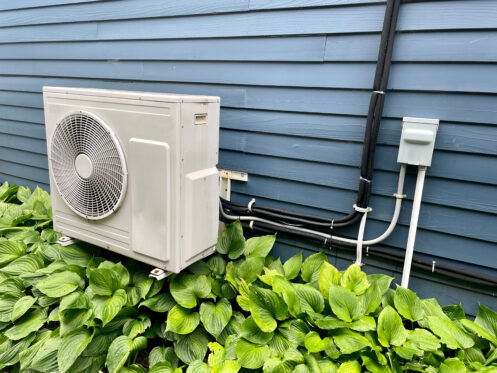If you’re considering replacing the HVAC system in your Houston home, you have many options. Generally, your available choices will fall into two categories: heat pumps and traditional HVAC systems. Traditional HVAC systems are typically a combination of a central AC and a furnace. On the other hand, heat pumps offer heating and cooling from a single system. Here’s everything you should know about heat pumps and how to choose between them and traditional HVAC systems.
What Is a Heat Pump?
If you’re unfamiliar with heat pumps, they are an efficient HVAC option that works well in Houston. They’re mechanically similar to conventional air conditioners but have a twist. The twist is that they include a reversing valve that lets them operate bi-directionally. In cooling mode, they collect heat from the indoor air and expel it outside. In heating mode, they collect heat from the outdoor air, using it to warm your home or office.
The Pros and Cons of Heat Pumps
The most significant advantage of a heat pump relative to conventional HVAC systems is its energy efficiency. The average heat pump offers cooling as efficient as a high-end central AC system. That’s to say, they tend to have high SEER ratings. In heating mode, heat pumps can be head and shoulders above all other heating options, efficiency-wise. Heat pumps can operate in mild weather at efficiencies approaching 400%. That’s about four times as efficient as any other heating system option.
Another advantage of a heat pump is that it emits no pollution. Gas furnaces emit CO2 and various other combustion byproducts as they work. Those are all harmful to the environment, as well as to your health. That’s why furnaces vent their combustion gases to the outdoors. If those gases enter your home or office, they can be hazardous to everyone inside. Heat pumps, by contrast, offer safe, clean operation and have virtually no carbon footprint.
Unfortunately, heat pumps have some disadvantages as well. The most notable among them is poor sub-freezing performance. In frigid weather, heat pumps often struggle to gather enough heat to meet indoor heating demand. In those cases, they may activate inefficient electric heat strips to augment production. That can result in sudden energy bill spikes. Also, heat pumps are more expensive upfront than traditional HVAC systems. You can expect to pay close to $10,000 on average for a heat pump. That’s about $2,000 more than a comparable ducted AC and furnace combination.
Types of Heat Pumps
You should know that heat pumps come in more than one form factor. That can make them a viable HVAC option in multiple situations. Ducted and ductless heat pumps are the two main options. Here are the strengths and weaknesses of each specific form factor.
The Pros and Cons of Ducted Heat Pumps
The biggest advantage of a ducted heat pump is that it shares a form factor similar to that of a conventional HVAC system. It consists of a single outdoor unit that looks nearly identical to one belonging to a central AC. Likewise, a ducted heat pump’s indoor unit is about the same size as a furnace air handler. That makes ducted heat pumps easy to install in homes and buildings configured for conventional HVAC systems.
One of the key disadvantages of a ducted heat pump is that it may suffer ductwork losses that sap its efficiency. Conventional ducted HVAC systems have the same problem. However, heat pumps operate at lower air temperatures in heating mode. Therefore, they’re more sensitive to ductwork losses, which can lead to inadequate heat delivery. This can also decrease the efficiency benefits of owning a heat pump.
The Pros and Cons of Ductless Heat Pumps
Ductless heat pumps, or ductless mini-split systems, have advantages over ducted heat pumps and conventional HVAC systems. One is that you can install them virtually anywhere. A mini-split system combines a single outdoor unit with one or more indoor, wall-mounted air handlers. They only need a small bundle of refrigerant and power lines connecting the two. Plus, a single mini-split system can serve up to eight air handlers. Ductless heat pumps are, therefore, a perfect upgrade for buildings lacking ductwork or for adding an HVAC system to newly finished spaces.
Ductless heat pumps can offer zoned heating and cooling by default and don’t suffer from ductwork losses. That makes them the most efficient heat pump form factor. With a mini-split system, you can set different temperatures in different rooms or even turn off air handlers in rooms you’re not using for greater efficiency.
Unfortunately, ductless mini-split systems are significantly more expensive than ducted heat pumps or conventional HVAC systems. That can make them cost-prohibitive in some circumstances. Also, needing an air handler in each room means sacrificing some wall space. It also means more maintenance since each air handler has an air filter that you must wash bi-weekly to ensure proper function and optimal indoor air quality.
Choosing Between a Heat Pump and a Traditional HVAC System
For most people, choosing between a heat pump and a traditional HVAC system will ultimately come down to price. A conventional HVAC system costs less upfront. Of course, there’s a good chance you’ll recoup the extra cost of a heat pump via energy savings during its lifetime. Many people more than recoup their costs. Also, generous tax credits worth up to 30% of a new heat pump’s cost and up to $2,000 can bring some heat pumps into cost parity with traditional HVAC systems. We also provide financing options on approved credit should you need help paying for your HVAC system.
Another consideration as you make your decision is your electrification plans. A heat pump makes the perfect companion if you’re considering a rooftop solar power system. Together, they can ensure that you have a reliable year-round HVAC system, even during grid failures. As the Texas power grid shows signs of strain, that’s a significant advantage.
You may also want to think about reliability. Although a heat pump will last about 15 years with proper maintenance, any failure deprives you of heating and cooling. With a conventional system, the only major shared component is a blower motor. So, an AC or furnace failure rarely affects the other system. That gives you a bit more flexibility in how and when you schedule needed repairs.
Local Heating and Cooling Experts
Since 1992, Mackey Services has offered quality HVAC solutions to Houston homes and businesses. We sell and install conventional HVAC systems and heat pumps from American Standard and Lennox. So, no matter what type of system you ultimately choose, we’ll provide the highest quality option. Plus, our HVAC technicians have extensive training and can ensure your installation meets the highest standards. We even have an on-site metal fabrication shop should your new HVAC system require ductwork installation or modification. And we’re Better Business Bureau accredited with an A+ rating, reflecting our commitment to quality service.
If you need a new HVAC system in Houston, call our team at Mackey Services today!





